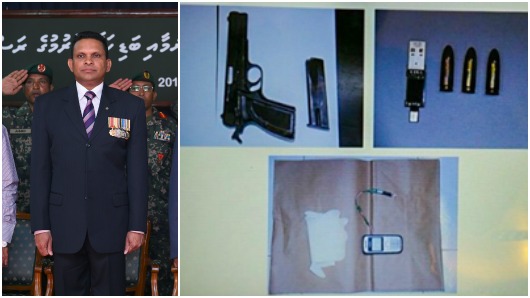Former President Mohamed Nasheed’s lawyers refused to appear in court today in protest of the Criminal Court’s alleged failure to provide adequate time to prepare defense.
Nasheed is accused of terrorism over the military detention of Criminal Court Chief Judge Abdulla Mohamed in January 2012. If convicted, he faces a jail term or banishment between ten and 15 years.
In a letter to the Criminal Court at 8pm, lawyers Hisaan Hussein, Ahmed Abdulla Afeef, Ibrahim Riffath and Abdulla Shaairu excused themselves from the seventh hearing stating they had not had enough time to prepare.
State prosecutors were scheduled to screen audio and video evidence today. The hearing was initially scheduled for 4pm, but was delayed to 8pm.
Speaking to the press outside, Hisaan said the Prosecutor General’s Office had provided defence lawyers with unlabeled CDs this morning. Some were not functioning while others were left blank.
Judges Abdulla Didi, Abdul Bari Yoosuf and Sujau Usman began the hearing an hour late at 9pm. The defense team’s no-show was unacceptable, Didi said.
The Criminal Court had already ruled Nasheed had been afforded enough time, Judge Didi said. If lawyers disagreed with the court’s rulings, they could lodge an appeal at the High Court, but they cannot protest the court’s rulings or obstruct court proceedings, he continued.
The bench would consider penalizing Nasheed’s lawyers under contempt of court regulations, he warned.
Nasheed once again requested the bench for 15 additional days to examine state evidence.
But Didi adjourned tonight’s hearing ordering Nasheed to ensure lawyers turned up tomorrow or appoint new lawyers for tomorrow’s hearing.
After the hearing ended, Nasheed asked court staff to pass on the following message to the bench: “I cannot appoint lawyers by tomorrow. I am under custody in Dhoonidhoo.”
Nasheed was arrested on February 22 on the Prosecutor General Muhthaz Muhsin’s claim the former president may abscond from justice. At the time of his arrest, Nasheed was not aware Muhsin had pressed new terror charges against him.
The first hearing was scheduled for the next day.
The new charges came after Muhsin withdrew previous charges of ordering an arbitrary detention in early February.
Nasheed appeared in court on February 23 with his arm in a makeshift sling after police officers manhandled and dragged him into the courtroom when he attempted to speak with journalists.
The former president was denied legal representation with the Criminal Court claiming lawyers must get appointed two days before a hearing is scheduled.
Nasheed pointed out he did know he would be charged with terrorism two days before. Judges then ruled he be kept in police custody until the end of the trial.
Nasheed’s lawyers have repeatedly requested for more time, claiming they required additional time to prepare for the new charges. But judges said the state had submitted the same documents during the previous arbitrary detention trial, and pointed out lawyers had been provided case documents in 2012.
At yesterday’s hearing, Nasheed said he preferred an immediate sentence over a trial without sufficient time to prepare his defense.
Nasheed’s lawyers have also pointed to what they call several irregularities in the case, including Judges Didi and Yoosuf having provided witness statements during the 2012 investigation into Judge Abdulla’s arrest.
PG Muhsin also had a conflict of interest in the case, they said, as he had been present at Judge Abdulla’s house at the time of his arrest.
The Criminal Court, however, ruled it had no conflict of interest and ordered state prosecutors and defense lawyers not to name them as witnesses.
Nasheed has also objected to police and military officers testifying against him, arguing they may be biased due to their role in his ouster in February 2012.
Judge Abdulla’s arrest sparked 22 consecutive nights of violent anti-government demonstrations that culminated in a police and military mutiny on the morning of February 7, 2012, forcing Nasheed to resign in what he subsequently called a “coup d’etat.”
Related to this story
State prosecutors influencing witnesses, claim Nasheed’s lawyers
Chief of Defense Forces testifies in Nasheed, Tholhath terrorism trials
Nasheed contests credibility of police and military witnesses in terrorism trial
Judges Didi and Yoosuf refuse to step down from Nasheed’s terrorism trial
Nasheed denies ordering Judge Abdulla arrest, granted three days to answer charges
Former President Nasheed arrives in court with arm in makeshift sling
Nasheed denied right to appoint lawyer and appeal “arbitrary” arrest warrant, contend lawyers
